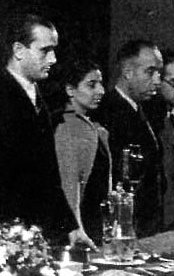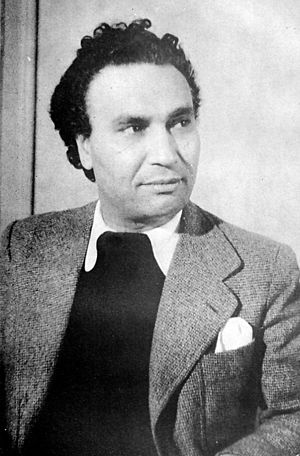Irene Falcón facts for kids
Quick facts for kids
Irene Falcón
|
|
|---|---|

Irene Falcón flanked by Vicente Uribe and Planelles at a PCE meeting in Moscow, 1940
|
|
| Born |
Irene Carlota Berta Lewy y Rodríguez
27 November 1907 Madrid, Spain
|
| Died | 19 August 1999 El Espinar, Segovia, Spain
|
| Nationality | Spanish |
| Occupation | Journalist |
Irene Falcón (born Irene Carlota Berta Lewy y Rodríguez; November 27, 1907 – August 19, 1999) was a Spanish journalist. She was also a strong supporter of women's rights and peace. Irene was a Communist activist.
For many years, she worked closely with Dolores Ibárruri. Ibárruri was a famous leader of the Spanish Communist Party. Irene Falcón is most known for this important role. After the Spanish Civil War, Irene had to leave Spain. She lived in Moscow and Beijing. She came back to Spain in 1977 when the country became a democracy again.
Early Life and Education
Irene Lewy Rodríguez was born in Madrid, Spain. Her birthday was November 27, 1907. She was the second of three sisters. Her father, Siegried Levy Herzberg, was from Poland. He was a middle-class Jewish man.
Irene's father died when she was only five years old. To make money, her mother rented out rooms in their house. Irene went to the German College. There, she learned to speak four different languages. Later, she got a job as a librarian. She worked for Santiago Ramón y Cajal, a famous biologist. He won the Nobel Prize.
In 1922, Irene met César Falcón. He was a journalist from Peru. They fell in love. Two years later, a newspaper called El Sol asked César to work in London. He was to be their correspondent there.
Irene went with him, and they got married. She also got a job as a correspondent. She wrote for a Spanish newspaper called La Voz (The Voice). Their son, Mayo, was born in London in May 1926.
Irene and César came back to Spain in 1930. This was after the dictator Miguel Primo de Rivera left power. The Falcóns started a newspaper called Historia Nueva (New History). They also began a political group. It was called Izquierda Revolucionaria y Antiimperialista (IRYA). This means Anti-Imperialist Revolutionary Left.
Irene also started a group for women's rights. It was called Mujeres Antifascistas (Anti-Fascist Women). She also helped publish books by women writers. These books included important feminist ideas of that time. Irene believed that women's freedom could bring peace. She wrote that mothers and wives could help stop wars. They could explain to men that true patriotism is loving all people.
Becoming a Communist Activist
In 1932, Irene and César joined the Spanish Communist Party. Their group, IRYA, joined this party too. This is where Irene met Dolores Ibárruri. People knew Ibárruri as Pasionaria.
Irene and César lost their jobs at the newspapers. They lived in a poor area of Madrid. They started a theater group called Teatro Proletario. This group was also known as Nosotros ("Us"). They performed plays by writers like Maxim Gorky. They also performed Hinkemann, a play against war.
In the summer of 1933, the theater group visited Moscow. The newspapers in the Soviet Union wrote a lot about their shows.
A group called the Spanish Committee of Women against War and Fascism was formed. It was connected to a bigger world committee. In August 1934, the Spanish group sent people to a meeting in Paris. Ibárruri led this group. Irene Falcón was also part of it. The Spanish committee was later closed down. This happened after a miners' strike in 1934.
In 1934, Irene went to Moscow again. She worked as a correspondent for Mundo Obrero. This was the newspaper of the Communist Party. She returned to Spain in 1937. This was during the Spanish Civil War (1936–39). She came back to help Dolores Ibárruri. Irene became Ibárruri's close helper and friend. They stayed friends until Ibárruri died in 1989. Irene used the secret name "Toboso." In March 1939, she helped important party members leave Spain safely. Ibárruri left for Oran on March 6, 1939.
Life in Exile
Irene Falcón went into exile with Ibárruri. First, they went to Paris. Then, they moved to the USSR (Soviet Union). There, Irene worked for a secret radio station called Radio Pirenaica.
Irene's marriage to César Falcón ended. During World War II (1939–45), Irene and César were separated. After the war, César went back to Peru.
Irene Falcón continued to support women's rights. She believed women should help fight against Fascism. In August 1946, she wrote in a Communist magazine. She said women could play a very important role in secret resistance. She wrote that women could support their partners and children who joined guerrilla groups. In August 1946, Irene became the national secretary of the Union of Spanish Women.
In 1952, there was a trial in Czechoslovakia. Eleven Communists were executed. One of them was Bedřich Geminder. He was a former friend of Falcón's. Because of this, Falcón was removed from the Communist Party. She lost her job at Radio Pirenaica. She and her sister were not allowed to work. Her son was also banned from the Soviet Communist Party. Ibárruri helped her find another job quietly.
In 1954, Irene Falcón went to Beijing, China. She helped start a radio station there that broadcast in Spanish. After about a year and a half, she returned to the USSR.
Irene Falcón came back to Spain in 1977. This was after Spain became a democracy again. She became the director of the Dolores Ibárruri Foundation. In 1996, she wrote a book about her life. It was called Asaltar los cielos. Mi vida junto a Pasionaria (Storm the Skies: My Life with Pasionaria).
Irene Falcón died on August 19, 1999. She passed away in El Espinar, Spain. She had a breathing problem.
Sources
- "Irene Falcón, secretaria personal de Pasionaria". El País. 1999-08-20. http://elpais.com/diario/1999/08/20/agenda/935100001_850215.html. Retrieved 2015-03-20.
See also
 In Spanish: Irene Falcón para niños
In Spanish: Irene Falcón para niños
 | Dorothy Vaughan |
 | Charles Henry Turner |
 | Hildrus Poindexter |
 | Henry Cecil McBay |


